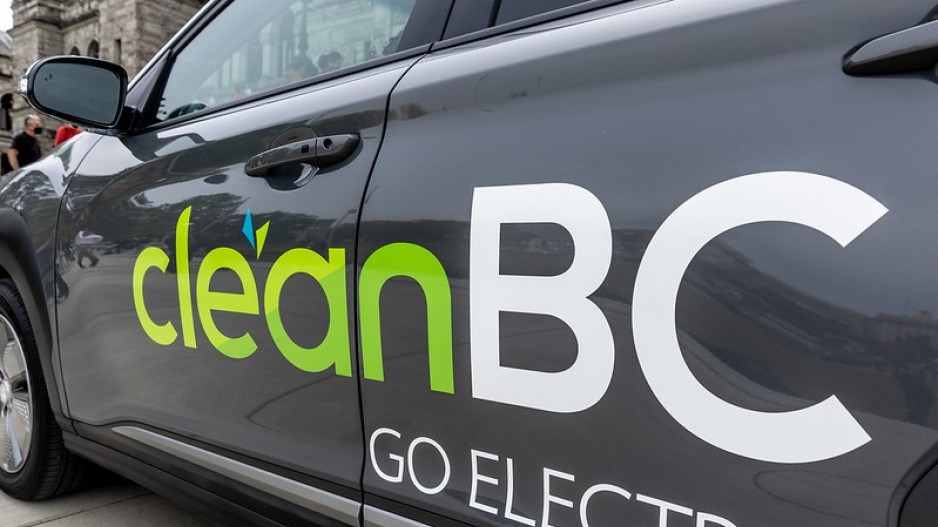B.C. splashed onto the global climate scene in 2008 when then-premier Gordon Campbell introduced North America’s first economy-wide carbon tax, enacted stringent vehicle emission standards, introduced a low-carbon fuels regulation and required the provincial government (including schools, hospitals and Crown agencies) to be carbon neutral by 2010.
A decade later, premier John Horgan brought in a CleanBC plan that not only strengthened many of the previous government’s climate policies, but introduced a suite of new measures, including a more ambitious emissions reduction target set in law, an EV availability standard and new rules to reduce oil and gas emissions.
Seventeen years on and the evidence is clear: B.C. has moved the needle on emissions. While the province’s population has grown 25 per cent over this period, carbon emissions between 2008 and 2023 are down almost five per cent — or nearly seven per cent if you measure from 2018, when CleanBC was announced. Put another way, real GDP grew by 41 per cent (compared to a national average of 27 per cent) while the economy’s net greenhouse gas emission intensity (emissions per unit of GDP) fell by 31 per cent. Net emissions per person have also declined by 22 per cent.
B.C.’s industrial sectors, spurred by provincial regulation and investments, have done much of the heavy lifting. Heavy industries, including mining, smelting, pulp and paper, cement, steel, gypsum, and chemicals and fertilizers have seen emission declines of 16 per cent over this period, while oil and gas production emissions are down 30 per cent.
And B.C.’s climate progress isn’t just about near-term emission reductions. The province is also a North American leader in EV adoption and in programs making heat pumps more accessible. Their uptake has been driven in large part by affordable electricity, consumer incentives and government regulations. This winning combination gets clean technologies into peoples’ homes, lowers energy bills and ultimately has a climate impact that, while more modest in the early years, becomes significant and essential in the long run.
British Columbians also remain invested in climate action. In a moment when housing, affordability and the economy are top of mind, recent polling from Clean Energy Canada shows that the average B.C. voter across the political spectrum supports doubling renewable energy, expanding household electrification, keeping the industrial carbon price and using LNG revenue for clean energy.
Admittedly, not everything is good news. The province is not on track to meet its 2030 climate target, and many CleanBC policies — including the oil and gas emissions cap, capping emissions from natural gas utilities and the clean transportation action plan — remain incomplete.
But failure to meet a near-term climate target should not be the death knell of CleanBC and provincial climate action. The 2030 target was ambitious well before a million new people moved to the province, to say nothing of an increasingly fraught geopolitical environment, high inflation and major supply chain challenges. The province must recognize that while navigating these challenges may require some climate measures to look different from what worked in 2018, throwing the baby out with the bath water is not in its economic or climate interests.
The global energy transition is underway. Of Canada’s 10 largest non-U.S. trade partners, all have net-zero commitments and carbon-pricing systems, and roughly half apply carbon border adjustments on imports and have domestic EV requirements reshaping their car markets. Investing in clean technologies and supply chains is now an economic imperative. The world has changed and so must the province’s approach to climate action.
B.C. has announced a review of its CleanBC plan to be completed this fall. The smart move is to build on CleanBC’s strengths, which include its newly revamped industrial carbon-pricing system, EV and heat pump rebates, and building out more renewable electricity generation as just a few examples.
Meeting British Columbians where they’re at and connecting climate action to the issues of the day — namely competitiveness, affordability and energy security — will be essential. It’s been said that climate is an era, not a single issue. That’s good advice for this government: Climate is part of how we solve everything else.
Mark Zacharias is a Simon Fraser University fellow and Rachel Doran is the executive director of Clean Energy Canada.


